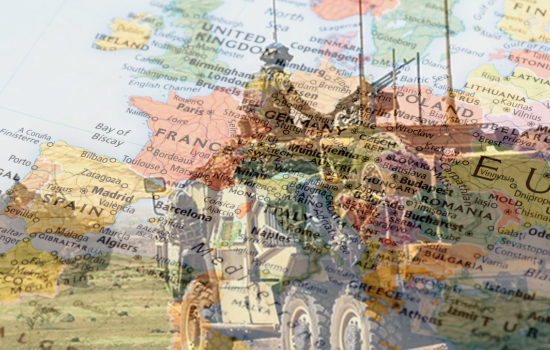Thank You America: The “Democratic Process” in Egypt
The election of Muhammad Mursi to the presidency of Egypt, and the rise of the Muslim Brotherhood to power in Egypt 84 years after its founding by Hassan Al-Banna, is an historical, political earthquake which will be discussed for years to come, whose significance will yet be analyzed by world experts. The meaning and implications of this tectonic shift for the Middle East, and its effect on the West, will yet be interpreted by the authorities and commentators in Western countries who proffered tranquilizers wrapped in “Realpolitik”, while justifying the paradigm of a “democratic process” fashioned, led and supported by the enthusiastic experts of the current and previous US administrations.
“There’s no need to exaggerate”, the experts on the Middle East and the Arab world in the US State Department will say. The Islamists in Egypt are pragmatic people. They’ll understand they need the good will of the West, and its investments; they won’t want to jeopardize that good will by discriminating against Christians, against women, or against people of other faiths. The experts who spearheaded the process of democratization will point out that 48% of the voters voted against their candidate for president; besides, the Egyptian Army will of course maintain its power in Egypt’s internal political arena, and it will continue to be the “gatekeeper”, an insurance policy against a surge in the Islamists’ power. We have heard similar arguments of reassurance before – when the Taliban rose to power and when America’s democratic experiment failed in Afghanistan, Iraq, and the Gaza Strip.
Revolutionaries and reformers, those who aspired to change the world have always had advocates in the democratic West. Comrade Vladimir Ilich Lenin defined such people as “useful idiots”;[i] alas, his lovely definition does not reduce their danger. A repeated error in understanding the mechanisms of revolutionaries in general, the Muslim Brotherhood among them, in particular, is founded in the restricted use they make of the word “party” to describe their organizations. This use creates the distorted impression that communist parties, or fascist parties, or Islamist parties are political parties like any other, the only difference between them and their rivals being that of means and goals.
But these are not political parties as we perceive political parties. Usually, a political party arises to compete for power in the context of elections and of a parliament. In any case, it is also willing to forfeit power. If it loses an election, it will honorably and, in accordance with the democratic game, serve in the opposition. Not so these parties, in whose nature and inbred DNA the ideological doctrine in whose name they act highlights the totalitarian revolutionary elements that plot to permanently and forever expropriate the whole of the public arena and the institutions of government – not merely for one parliament’s temporary term (at whose conclusion democratic elections will again be held, as accepted in the democratic-liberal West), but forever and irreversibly.
One of the Muslim Brotherhood’s most effective tools is having appropriated a large part of the state religious system and mechanisms, its welfare, education and health services –having made extensive use of Islamic “Dawa” infrastructure [missionary work] to “win the hearts and minds” of believers even before it seized power. This appropriation gave the Brotherhood legitimacy, and created material, sometimes physical, and certainly political dependency on it. Such organizations may be said to be the existing “skeleton” or “backbone” that awaits the opportunity of a “democratic process”, under whose auspices it may be elected by the masses. Then it will take on flesh, skin and muscle, becoming a whole entity with the influence to generate a political-social-economic and religious revolution.
The electoral infrastructure of the Muslim Brotherhood was already arrayed through the length and breadth of Egypt. This is how totalitarian organizations – the Muslim Brotherhood is no exception – usually succeed in emerging from the underground with remarkable speed to facilely exploit any democratic opportunity. We have seen similar things in the past, in countries that emerged from brutal right-wing tyrannies in Europe and Latin America. During the past year we have seen how, in the name of democracy, the Muslim Brotherhood has come to the fore in Tunisia and Morocco, and now in Egypt; tomorrow it will do so in Syria, and the next day in Jordan. Al-Qaeda is waiting patiently, harnessing these processes to promote its ends, which in the meantime are being achieved by others; but the strategic direction is clear.
As we have come to know elsewhere in the world, the rules of the democratic process do not interest revolutionaries. They have no intention of ever again entering a popularity contest – not to say subsequent elections. The democratic process ends with their rise to power. In the best case, wherever the forces of radical Islam have come to power, the familiar “democratic process” has begun with intolerance of any ideas different from or foreign to the Islamic paradigm that “Islam is the solution” [Islam hu al-hal]. In this context, we have seen the concrete examples of what transpired in Iran, and of what the “democratic” government elected in the Gaza Strip has wrought since coming to power, how organizations in the Gaza Strip that support Al-Qaeda have grown stronger under the rule of Hamas.
Supporters of General Ahmad Shafiq, the Facebook and blogger generation of Egypt, the secular young men and women of Tahrir Square, and the members of the Nasserite left may be tempted by the Islamists’ invitation, in the name of Egyptian national responsibility, to join them to “protect democracy”. However, it appears their fate is already sealed. Their role will soon end, just where the role of “useful idiots” has always ended, once they’ve been recruited to the service of revolutionaries.
As it was, so shall it be this time, too. Thanks to America and the “useful idiots” for identifying a “golden opportunity” at the right time and place. Special, added thanks for exploiting that opportunity “wisely and responsibly”, in a way that will contribute to the stability and prosperity of the peoples of the region.
Note:
[i] In political jargon, useful idiot is a term used to describe people perceived as propagandists for a cause whose goals they do not understand, who are used cynically by the leaders of the cause.






